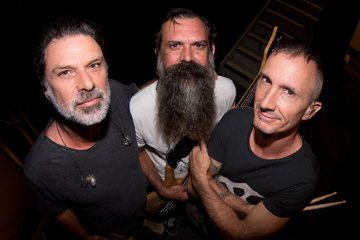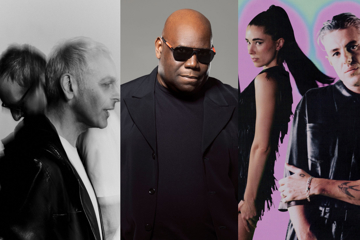Will Putney on Fit For An Autopsy, END, bucket list bands, mixing & more

"I’m happy when the fans are happy."

A month ago, if you'd asked me who in the heavy music scene I’d wish to interview most, I would have given you one name: Will Putney. Good odds are you all know exactly who Will is. He's a big name for a multitude of reasons: being the main-songwriter of the monstrous Fit For An Autopsy, guitarist/songwriter to the killer hardcore super-group END, as well as being one of the most talented and well-known audio engineers in metal; someone who's likely produced and worked on a good chunk of your favourite albums. In 2018 alone, Will worked on new releases from the likes of Hopesfall, Vein, Psycroptic, Greyhaven, Unearth, Terror, Silent Planet, Lume, Harm's Way and plenty more.
Will is an extremely gifted individual and his staggering reputation in the metalcore and hardcore realms are more than well-deserved. In all honesty, FFAA is one of my all-time favourite bands, END just rock my world, and I'm a massive fan of his production work too. As such, in being an avid fan of Will's multiple outputs, I figured many others must be too; hence why I reached out to the man himself for an interview recently. And Will was more than happy to chat and answer all questions thrown his way! [PC: Bobby Bates].
Will, I first wanted to thank you so much for your time as I know you are likely very busy person right now. I’ll begin with your work at Graphic Nature Audio. Which band or bands that have recorded with you have absolutely blown you away with their material and performances, leaving a lasting impression on you even now?
I’ve been fortunate to work with tons of very talented bands, but recently Night Verses fully blew me away. Everyone in that band is a weapon, with super creative and non-conventional uses of their instruments. From a technical standpoint, they’re all at the top of the game, but they manage not to get lost in the shred and still remain vibey. It’s a perfect marriage of the two. Definitely one of the coolest bands out there.
Agreed! So, what do you personally believe is the worst mix that you think you've done in hindsight? Likewise, which mixes of yours do you think are your best and have held up the most?
I’ve been asked this question before, and I really don’t have an answer. Everything is so subjective in this world, some things I’m not personally the happiest with turn out to be an audience's favourite mix. I think I’ve definitely taken some risks in regards to unconventional sonics in some genres that are more standardized with their production. Sometimes they work great and sometimes it’s met with criticism. In fact, I feel like some of my worst mixes actually helped me the most early on, because the bands wound up breaking and it was a catalyst to my career, even with a mix that now I would cringe at hearing [laughs].
Fair points there. A decent amount of records you work on are from returning clients. So would you say one of the most important aspects of your role is that balance between making a connection with the actual people, as well as making their records sound good?
Absolutely! You have to understand the artists and to some extent, be aligned with what they’re trying to accomplish. Part of why I think I have so many return clients is the bond we form as friends and artists. It makes the workflow easier, and about as stress-free as making a record could be.
Don't miss a beat with our FREE daily newsletter
Are there any bands that you love that you'd like to work with in the future? Any bucket list projects that you'd wish to be apart of?
Lately, I’ve been really into going after the bands that inspired me when I first got into metal and hardcore. Terror, Every Time I Die, and Unearth were big bucket list ones for me. I’ve been trying to do a Comeback Kid record for like six years now - I really feel like I could do that record justice. Andrew Neufeld, if you're reading this, let’s go already! [Laughs]. There’s plenty of other bands I love that I’d love to work with too: Deftones, Thrice, Russian Circles, Alice In Chains, At The Gates, Pennywise. I’d love to hear a Neurosis record through my lens. I’d also trade off most of my discography for Kurt Ballou’s. I could go on forever here!
Well, fingers crossed that that Comeback Kid job happens one day! Who would you pick out as your key inspirations, Will? Both in terms of bands as well as other engineers and producers?
Machine (Gene Freeman) was a huge influence on me. He’s the producer I got my start under and I basically learned how to make records from him. I wouldn’t be where I am today without his mentoring. Otherwise, I just pull from everywhere. There are a lot of talented producers and artists in the world, I don’t really have one go to engineer or band. It’s always project dependent. I’ll look at what I’m trying to create and see who out there is doing that the best, and draw from that.
Right on. What advice do you have for other engineers out there who are trying to create that "Putney" sound when they're working "in the box"? [Meaning that you're working solely on a computer with no outboard or analogue gear].
I think a lot of what I do can be done in the box at this point. It all starts with the sound sources, really. I’ve invested a lot of time, money, and energy into figuring out what instruments and mics help me capture the best from the performance, and that’s a large part of my “sound”. There’s nothing in the analogue domain I’m doing where I feel like you couldn’t achieve a version of it in the box. Sure, I prefer certain outboard gear, but it’s not a deterrent that I think would hinder anyone from achieving similar sonics.
So, how do you get those killer snare tones, the kind that we hear on records like Vein's 'errorzone', Kublai Khan's 'Nomad' and even Counterparts' last album? Where's the overlap occurring between the snare drum itself, the drummer playing it, and the work you do in the mix?
Those are all pretty drastically different snare tones and players, but the one thing they all do have in common is they are great drummers. And they smash the snare! They were probably captured with similar mics and good attention to the tuning of the drum. 'Errorzone' specifically, that pingy snare was always a few turns away from falling apart. In the mix, they do all sit relatively forward, so you’re drawn to it as a primary feature of the mix. I like loud snares, as I feel like it’s the heart of the drum sound and the crucial piece to give a drum mix a vibe.
For sure! Although you're a huge mixer/masterer/producer in the heavy scene, many also know you as the songwriter in Fit For An Autopsy and END. FFAA is coming up on the second anniversary of your last album, 'The Great Collapse', and END’s debut 2018 EP isn’t too far behind either. How busy do both bands keep you now, and can we expect new music from both projects to arrive in 2019?
FFAA keeps me surprisingly busy even without doing the full time touring. I handle all the business for the band, and that’s become more time consuming as the band has grown in size over the years. There’s some form of daily work there, but it’s manageable. END is pretty relaxed, we just do little bits of things for fun and it isn’t life-consuming. But 2019 should be fun years for both projects, as there are records on the horizon for both bands.
Awesome, can't wait to hear both of them! As someone who considers the last three FFAA records as some of the best modern metal albums around, it’s obvious to see the varying, ever-changing styles present on each record. FFAA has progressed from standard deathcore to more of a creative, expressive heavy act. Where can we expect to see FFAA chart in the future? What creative ideas are flowing right now?
I appreciate that! I think we’ve tried to move the band into its own space over the past few years so it’s nice to see people are recognizing that. The new material definitely continues down that line, I wanted to create more timeless music, songs that wouldn’t live and die in sub-genres as tastes changed. Going back and revisiting the records that first got me into metal and hardcore, there was so much staying power in the scene. I approached the new material with that mentality. I think it inherently pushed the record in a more classic metal vibe, but there’s a level of epicness to the song movements that looking back I feel we only started to capture on the last record.
Five years after release, 'Hellbound' (which I personally consider a masterpiece) has finally been pressed on vinyl for the world to spin on their own record players. What made you guys finally decide it was time to put this album to wax and how did it come to fruition?
We always wanted it on vinyl! The label initially didn’t do a pressing for financial reasons. Now that we have a bigger fan base I suppose they were more comfortable with it. I just kept bringing it up knowing there was a demand for it and it finally happened.
Well, thank you for constantly pushing for that, man! I actually nabbed my vinyl copy of it recently. What would you argue are the key differences between mixing a metalcore record ten years ago vs the engineering of a metalcore album now in 2019?
Technology is vastly different now, and there are extremely powerful tools to sculpt a mix in a computer. There are pros and cons to it, it’s a redundant debate at this point. But like any tool, if used right, there are more advantages today than there were a decade ago. Accessibility is the biggest difference. Almost any engineer has access to all of these powerful plugins, so you have to stay creative with the way you manipulate them if you want to stand out.
Great point; it's about how you use the tools at your disposal. Who would you say are the best or most interesting vocalists to work in the studio, whether it's down to their style or lyricism? Do you think much about the lyrics and emotion when mixing?
I really liked working with Brent from Greyhaven. He’s a really creative performer and lyricist, and he embodies a lot of really emotional and intense characters in his vocal. CJ from Thy Art Is Murder is always fun, he’s just a powerhouse vocalist with a lot of creative voicings and dynamics in what is normally a sterile genre. I’m a big Brendan Murphy fan too. I mean, we started a band together [END], so that’s a testament of how much I like him as a singer [laughs]. He’s a very poetic vocalist who finds a way to make things translate that normally would go over kids heads. That’s a tough one to pull off!
Great vocalists, for sure. What is your go-to reference mix, whether it's a record you've loved over the years or one that you've worked on yourself?
I have a little mix reference playlist with some of my favourite mixes that I use for quality control. A lot of Andy Wallace, Eric Valentine, Ben Grosse, and GGGarth, stuff in there. It’s funny, most of the records I think sound the best were made over a decade ago. I think there was a sweet spot in time where the computers were emerging in mixing, but the big consoles guys still worked in the analogue realm with some extra toys in the box. I probably subconsciously try to live in that moment when I’m mixing.
Interesting! I'll end with a question that might either be difficult or even quite easy to answer. What is, singlehandedly, your favourite song that you have ever worked on and why, whether it be something that you wrote or produced?
Man, that’s a tough one! So many songs have passed through here. I think my favourite songs are the ones where the vision and message translate to the listener. It is the most rewarding and satisfying part of a job when people “get it”. That’s happened in a big way on a lot of records I’ve done: Northlane’s 'Singularity', ETID’s 'Low Teens', and I think recently, 'Black Mammoth' from the last FFAA record was really great in how it reacted. We were able to raise thousands of dollars with the release of that song for a charity, and it was cool to create music and actually have an impact with a result like that. I’m sure there are plenty more, but I guess the takeaway is: I’m happy when the fans are happy.







